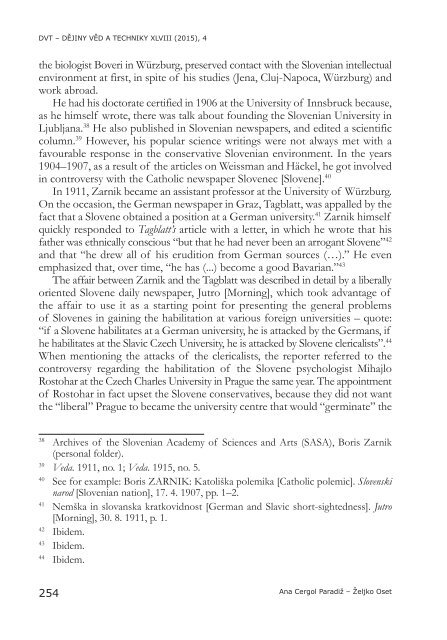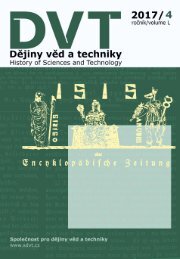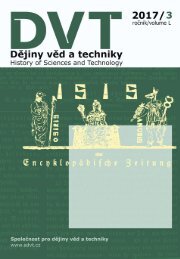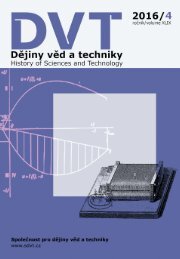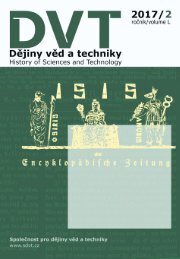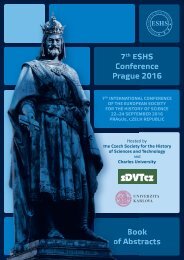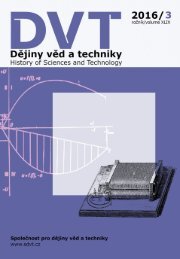Dějiny věd a techniky 2015, 4
Číslo je věnováno 7. mezinárodní konferenci Evropské společnosti pro dějiny vědy, která se konala 22.–24. září 2016 v Praze.
Číslo je věnováno 7. mezinárodní konferenci Evropské společnosti pro dějiny vědy, která se konala 22.–24. září 2016 v Praze.
Create successful ePaper yourself
Turn your PDF publications into a flip-book with our unique Google optimized e-Paper software.
DVT – DĚJINY VĚD A TECHNIKY XLVIII (<strong>2015</strong>), 4<br />
the biologist Boveri in Würzburg, preserved contact with the Slovenian intellectual<br />
environment at first, in spite of his studies (Jena, Cluj-Napoca, Würzburg) and<br />
work abroad.<br />
He had his doctorate certified in 1906 at the University of Innsbruck because,<br />
as he himself wrote, there was talk about founding the Slovenian University in<br />
Ljubljana. 38 He also published in Slovenian newspapers, and edited a scientific<br />
column. 39 However, his popular science writings were not always met with a<br />
favourable response in the conservative Slovenian environment. In the years<br />
1904–1907, as a result of the articles on Weissman and Häckel, he got involved<br />
in controversy with the Catholic newspaper Slovenec [Slovene]. 40<br />
In 1911, Zarnik became an assistant professor at the University of Würzburg.<br />
On the occasion, the German newspaper in Graz, Tagblatt, was appalled by the<br />
fact that a Slovene obtained a position at a German university. 41 Zarnik himself<br />
quickly responded to Tagblatt’s article with a letter, in which he wrote that his<br />
father was ethnically conscious “but that he had never been an arrogant Slovene” 42<br />
and that “he drew all of his erudition from German sources (…).” He even<br />
emphasized that, over time, “he has (...) become a good Bavarian.” 43<br />
The affair between Zarnik and the Tagblatt was described in detail by a liberally<br />
oriented Slovene daily newspaper, Jutro [Morning], which took advantage of<br />
the affair to use it as a starting point for presenting the general problems<br />
of Slovenes in gaining the habilitation at various foreign universities – quote:<br />
“if a Slovene habilitates at a German university, he is attacked by the Germans, if<br />
he habilitates at the Slavic Czech University, he is attacked by Slovene clericalists”. 44<br />
When mentioning the attacks of the clericalists, the reporter referred to the<br />
controversy regarding the habilitation of the Slovene psychologist Mihajlo<br />
Rostohar at the Czech Charles University in Prague the same year. The appointment<br />
of Rostohar in fact upset the Slovene conservatives, because they did not want<br />
the “liberal” Prague to became the university centre that would “germinate” the<br />
38<br />
Archives of the Slovenian Academy of Sciences and Arts (SASA), Boris Zarnik<br />
(personal folder).<br />
39<br />
Veda. 1911, no. 1; Veda. 1915, no. 5.<br />
40<br />
See for example: Boris ZARNIK: Katoliška polemika [Catholic polemic]. Slovenski<br />
narod [Slovenian nation], 17. 4. 1907, pp. 1–2.<br />
41<br />
Nemška in slovanska kratkovidnost [German and Slavic short-sightedness]. Jutro<br />
[Morning], 30. 8. 1911, p. 1.<br />
42<br />
Ibidem.<br />
43<br />
Ibidem.<br />
44<br />
Ibidem.<br />
254<br />
Ana Cergol Paradiž – Željko Oset


